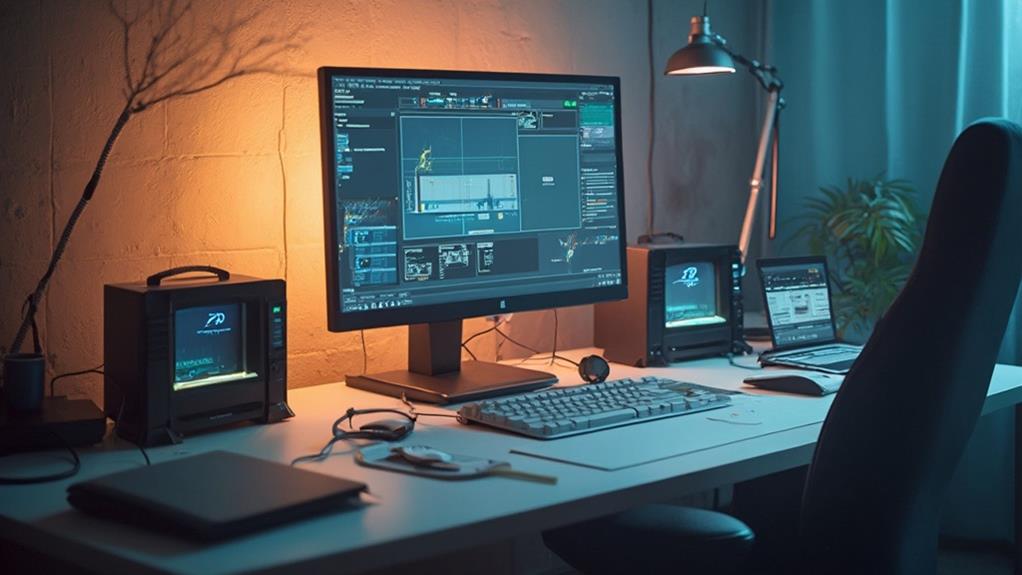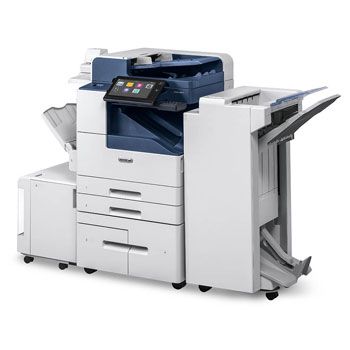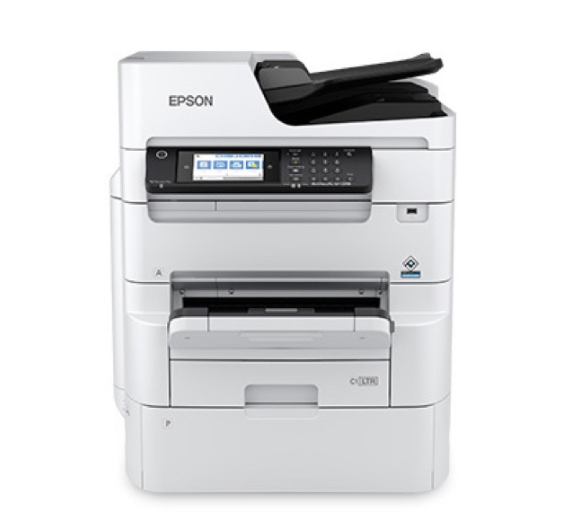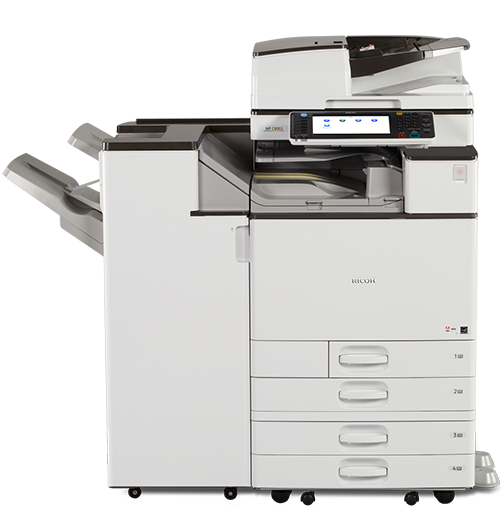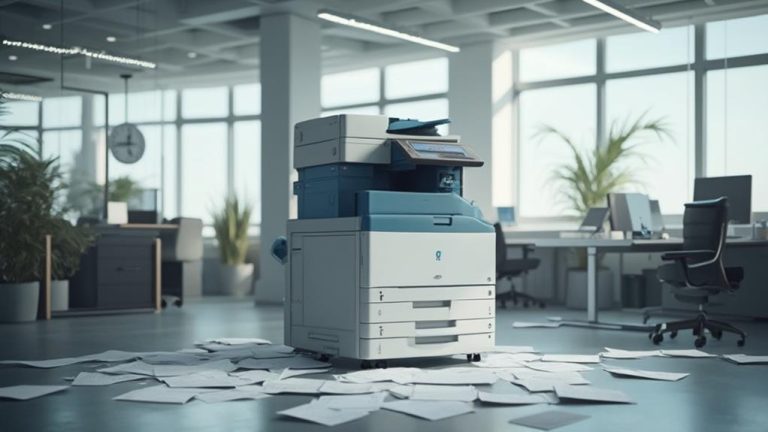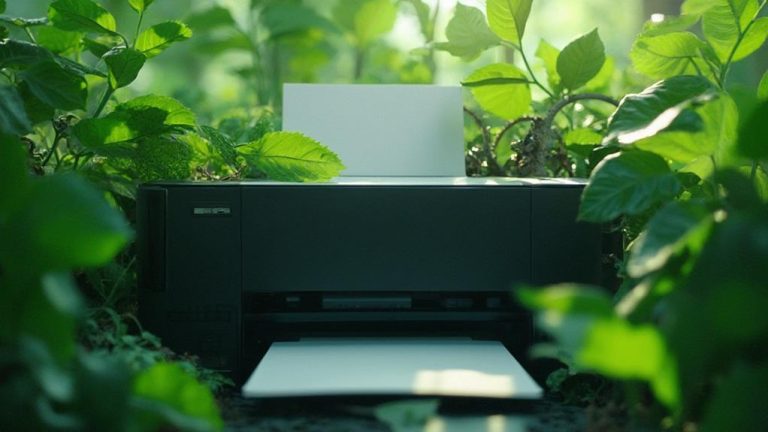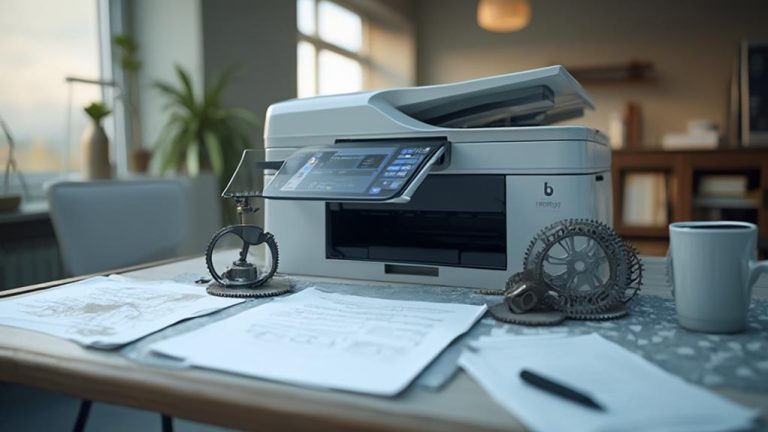The impact of lease length on office equipment technology upgrades is substantial. Shorter leases allow businesses to align equipment with the latest technological advancements, fostering innovation and flexibility in equipment choice. They provide the agility needed for prompt technology updates but can incur higher renewal costs. Conversely, longer leases offer lower monthly payments and stable budgeting but risk equipment obsolescence and elevated maintenance costs. These leases can hinder the quick adoption of cutting-edge technologies, potentially affecting operational efficiency. Businesses must strategically balance lease duration with their technological goals to maintain competitiveness and guarantee their equipment remains relevant in a rapidly evolving landscape.
MF Printer Lease Highlights
- Shorter leases provide flexibility for frequent technology updates, aligning with rapid advancements.
- Longer leases generally have lower monthly payments but can hinder access to the latest technology.
- Frequent lease renewals can increase costs, impacting budget and operational planning.
- Longer leases may result in equipment obsolescence and potentially higher maintenance expenses.
- Strategic alignment of lease durations with business goals is crucial for maintaining technological competitiveness.
Lease Duration Effect Explained
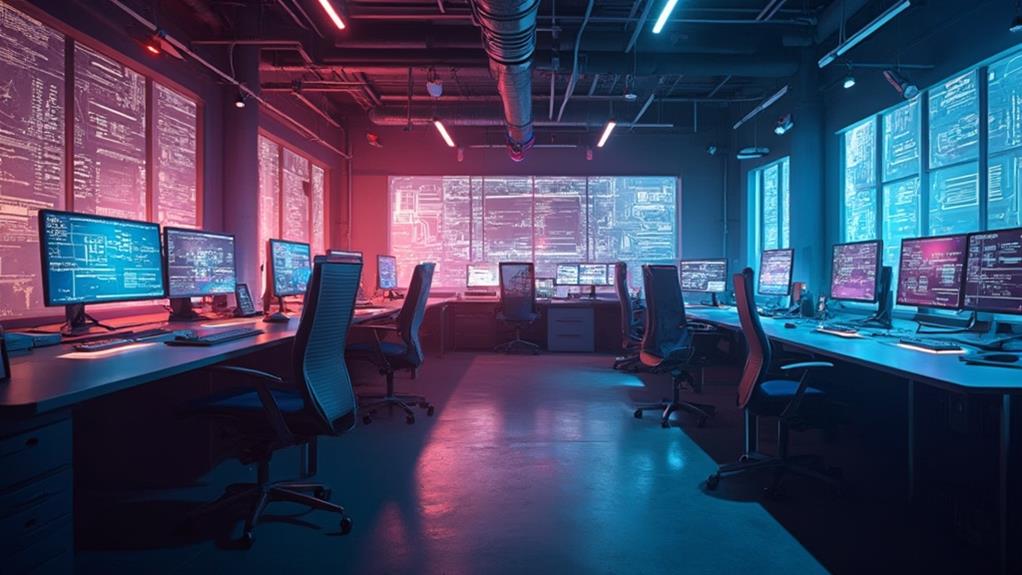
The duration of a lease agreement plays a significant role in determining the costs associated with office equipment technology upgrades, as longer leases may limit opportunities for cost-effective updates. Shorter lease terms provide greater flexibility in choosing updated office equipment through lease or rental agreements, allowing organizations to adapt to technological advancements and align their equipment more closely with current advancements and operational needs.
This flexibility can prove to be economically advantageous for businesses looking to stay competitive. Additionally, the timing of technology changes is essential, as it impacts an organization's ability to maintain a competitive edge and meet evolving business demands efficiently.
Costs Related to Upgrades
Lease durations play a pivotal role in determining the financial implications associated with office equipment technology upgrades. The duration of an equipment lease directly influences the timing and cost of technology enhancements. Shorter lease periods generally offer more frequent opportunities to upgrade to advanced technologies, potentially aligning with the rapid pace of technological advancements. This flexibility, however, may lead to increased costs due to more frequent lease renewals and associated expenses, such as installation and training for new systems.
On the other hand, longer lease durations may introduce different cost considerations. While they often secure lower monthly payments and reduce the frequency of expenditure related to lease renewals, longer terms might result in obsolescence. Organizations may find themselves tethered to outdated technology for longer periods, which could lead to inefficiencies and higher maintenance costs. Balancing lease duration with the organization's technology strategy is critical to optimizing these costs.
Organizations aiming to harmonize their financial strategies with technological needs must consider these factors carefully. By aligning lease lengths with anticipated technology needs, companies can effectively manage their budgets and maintain their competitiveness in an ever-evolving digital landscape. Through strategic planning, firms foster a sense of financial stability and technological agility.
Flexibility in Technology Choices
Leveraging the lease duration is essential for organizations seeking flexibility in technology choices. Shorter lease agreements offer the advantage of frequent technology upgrades without long-term commitments. For teams that thrive on innovation and wish to keep pace with the ever-evolving technological landscape, this flexibility becomes instrumental. It enables businesses to access the latest office equipment and integrate cutting-edge technology more quickly, aligning with dynamic operational needs and workforce expectations.
In contrast, longer lease durations often correspond with lower monthly payments, providing a stable and predictable budgeting environment. This can be appealing for organizations with established technology requirements and less frequent needs for updates. Such stability fosters a sense of community among employees as they become experts with familiar tools and systems over extended periods. However, it may restrict rapid advancements in technology adoption.
Balancing these lease duration trade-offs requires careful consideration of an organization's strategic goals. Decisions about lease terms should take into account not only current technological infrastructure but also the potential need to accommodate future technological growth and adaptability. A thoughtful evaluation can guarantee that the organization remains relevant, competitive, and able to nurture a sense of progress and community through its technology choices.
Timing of Technology Changes
When organizations evaluate their technology upgrade strategy, timing emerges as a pivotal element influenced by lease duration. The length of lease agreements on office equipment plays an essential role in aligning technology updates with organizational goals and market standards.
Short-term leases typically offer greater agility, enabling frequent upgrades to the latest technology. This frequent refresh cycle can be advantageous for businesses aiming to maintain competitive advantages through state-of-the-art equipment. Conversely, longer lease commitments may delay technology updates, potentially hindering operational efficiency if new advancements are rapidly introduced to the market.
Furthermore, timing technology changes effectively is not just about matching lease periods with upgrade cycles but also involves strategic planning to coordinate with budget constraints and workforce needs. Organizations must consider how lease durations impact their ability to adopt essential technologies promptly. Implementing structured review processes aligning with lease renewals can aid in evaluating whether existing technology meets evolving business demands.
Reliable Office Equipment Solutions for Your Business
At ABC Office Solutions, we comprehend that dependable office equipment is pivotal for sustaining productivity and efficiency in any business environment. That's why we endeavor to keep you equipped with the latest technology, such as Xerox office equipment, which offers high-performance and innovative solutions.
With our extensive lease options, we provide flexible and cost-effective solutions tailored to meet the unique needs of your company. Our team of experts keeps you up-to-date with the latest technology, ensuring your office is equipped with high-performing printers, copiers, and other essential tools.
Our service offerings include regular maintenance, quick response support, and customized equipment packages to help businesses minimize downtime and maximize operational performance. With a focus on customer satisfaction, ABC Office Solutions is committed to delivering exemplary service and innovative solutions to empower your business.
Benefits
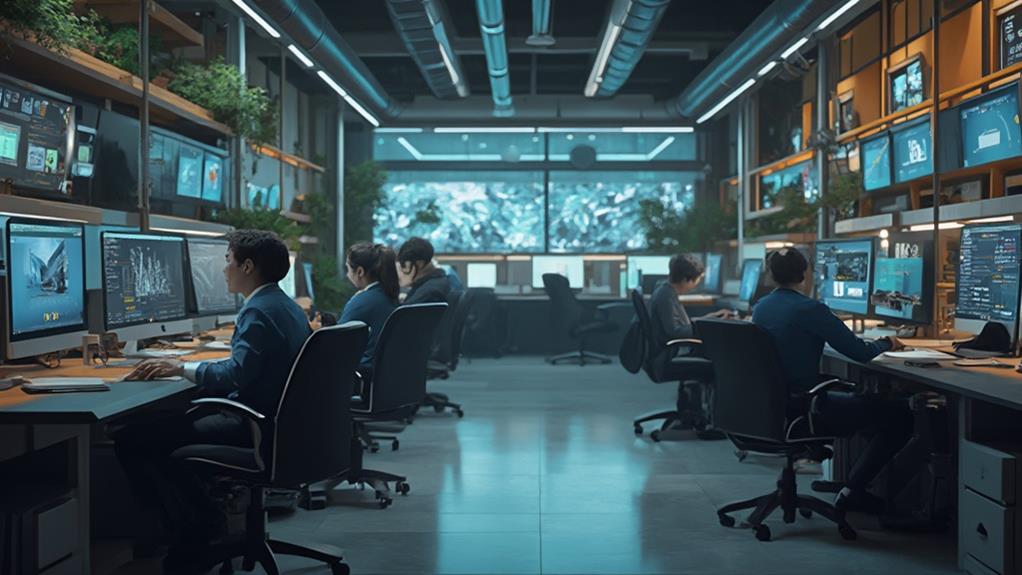
The strategic management of lease lengths for office equipment offers significant benefits such as enhanced budget planning and access to technological innovations.
One of the key advantages of leasing office equipment is the flexibility it provides, enabling businesses to allocate resources more efficiently. With flexible lease options, companies can effectively manage costs while staying abreast of the latest advancements in office technology. This approach not only guarantees cost-effective technology management but also empowers businesses to adapt swiftly to changing technological landscapes.
Enhanced Budget Planning
With strategic lease planning, businesses can considerably enhance their budget management when considering office equipment technology upgrades. This planning approach allows companies to allocate resources more efficiently, reducing unforeseen expenses and fostering a structured financial outlook. By choosing lease agreements with terms that align with budget cycles, firms gain predictability in cash flow. This predictability enables organizations to plan for other financial responsibilities with greater confidence.
Additionally, leasing helps in spreading costs over an extended period, avoiding substantial upfront expenditure that often strains capital reserves. Moreover, having fixed monthly lease payments facilitates accurate forecasting and budgeting processes. This consistency aids in maintaining fiscal discipline while also allowing room for potential reinvestment in other pivotal areas of operation.
Another financial benefit of strategic lease management is linked to tax advantages, as lease payments may qualify as deductible business expenses, further optimizing fiscal efficiency. In fostering a culture of financial prudence and foresight, strategic lease planning becomes an instrumental tool for a business community seeking stability and growth. Importantly, it assists in aligning financial strategies with organizational objectives, ensuring that the path toward technology upgrades is both sustainable and advantageous.
Access to Innovations
In the fast-evolving landscape of office equipment, technology leasing agreements provide businesses with unparalleled access to cutting-edge innovations. These agreements facilitate the smooth integration of the latest technology into office workflows, guaranteeing that organizations remain competitive and efficient. By choosing a leasing model, companies can bypass the high initial costs often associated with outright purchases, making advanced technology more accessible, even for small and medium enterprises.
Leasing office equipment underpins a strategic advantage, allowing businesses to stay updated without significant capital expenditure. It provides opportunities to adopt new technology more rapidly, which is indispensable in today's fast-paced market dynamics. Innovatively engineered equipment often includes enhanced features that improve productivity, streamline operations, and reduce energy consumption. Such benefits are essential in maintaining operational efficiency and sustainability.
Moreover, manufacturers frequently release upgraded models, integrating new tech developments and improvements. Leasing arrangements often include an upgrade path, offering businesses the option to replace or update equipment as part of the lease terms. This confirms the business infrastructure is continually optimized. Staying at the forefront of technological progress fosters a sense of belonging within the industry, aligning businesses with the latest advancements that define market trends and consumer expectations.
Flexible Lease Options
Many businesses find flexible lease options essential for adapting to the ever-changing demands of modern office environments. By opting for agreements that offer more adaptability than traditional leases, companies can tailor their equipment use to their unique circumstances, ensuring they remain up-to-date with industry shifts. Flexible lease options provide several key benefits that enhance corporate agility and alignment with technological progress.
Scalability and Flexibility: Businesses experiencing variable growth can adjust their equipment needs without being locked into long-term commitments. This flexibility allows firms to quickly scale resources up or down as demand dictates.
Reduced Risk of Obsolescence: Technology evolves rapidly. Leasing options that permit frequent updates protect firms from relying on outdated equipment, allowing them to remain competitive and efficient.
Cash Flow Management: Short-term commitments facilitate periodic reassessment of financial strategies, enabling businesses to better manage cash flow and allocate resources to areas where they are needed most.
Cost-Effective Technology Management
Leveraging flexible lease options not only provides adaptability but also leads to more cost-effective technology management. This approach allows businesses to tailor their office equipment solutions to fit current operational needs while maintaining financial prudence. By selecting shorter lease terms, organizations can better align with technological advancements, ensuring they are not left behind in rapidly changing environments. This strategic method fosters fiscal responsibility, as it minimizes overinvestment in technology that may soon become obsolete.
Furthermore, adopting a leasing strategy can dramatically reduce initial investment costs associated with purchasing office equipment. Instead of substantial upfront expenses, companies can spread costs over time, preserving cash flow for other essential business operations. This continual renewal of technology through leasing ensures that office tools remain up-to-date, enhancing productivity and efficiency, which is crucial for cohesive team performance and organizational belonging.
Additionally, leasing often includes comprehensive maintenance and support packages, eliminating unexpected repair costs and reducing administrative burdens. These services provide peace of mind, allowing businesses to focus on growth and innovation rather than equipment maintenance. In summary, flexible leasing not only addresses immediate technological needs but also supports sustainable, cost-effective management in the long run, fostering a strong sense of community within the organizational framework.
JR Copier's Customer Reviews
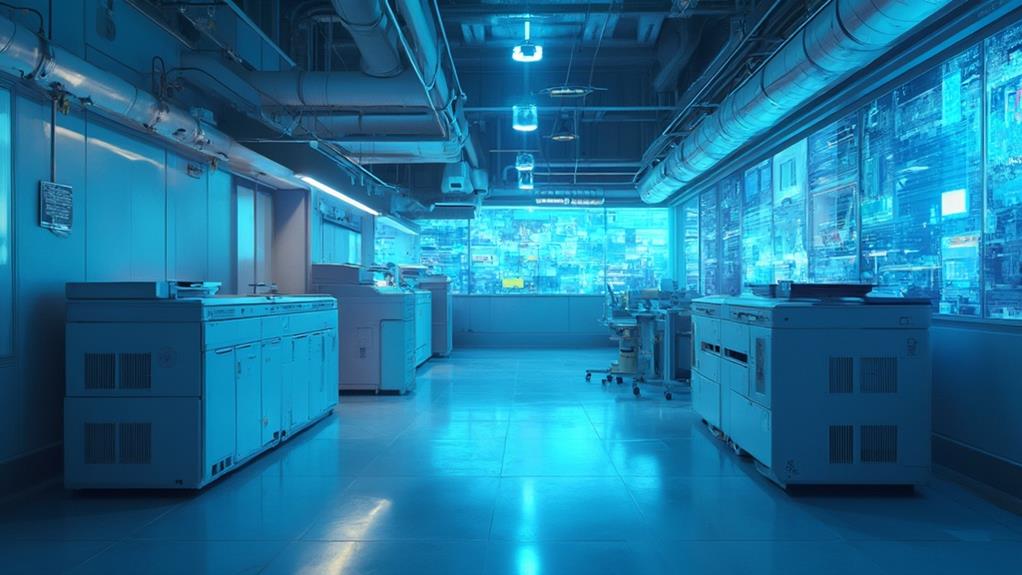
JR Copier's customer feedback offers significant insights into user experiences, service quality, and equipment performance, which are essential for businesses considering lease agreements. These reviews often highlight satisfaction with timely service responses and reliable machine functionality. The table below provides a structured overview of key takeaways from recent customer evaluations.
| Aspect | Positive Comments | Improvement Suggestions |
|---|---|---|
| User Experience | Intuitive interfaces | Enhance digital documentation |
| Service Quality | Prompt technical support | Extended support hours |
| Equipment Performance | Durable and efficient | Regular software updates |
| Overall Satisfaction | Consistent performance | Additional training resources |
User Experience Insights
How do customers perceive the impact of lease length on their office equipment technology upgrades? For many, the experience is multifaceted and highly influenced by lease terms. Customers frequently highlight several key insights in their reviews, which serve to inform potential choices among leasing options. These insights can greatly impact the overall technological experience within organizations.
Longer lease terms can at times limit the ability for rapid technology upgrades. Customers have noted that extended lease periods may hinder the adoption of newer, more efficient models that arrive on the market during the lease term.
Shorter leases, though providing more frequent opportunities for upgrades, often come at a higher per-month cost. Some users perceive these costs as justified for the benefits of having state-of-the-art equipment, while others value budget predictability more highly.
A recurrent theme is the risk of technology becoming obsolete during a prolonged lease. Many users advocate for shorter leases to minimize the chances of falling behind industry standards.
Such detailed insights emphasize the importance of matching lease length to organizational needs, ensuring both technological relevance and financial feasibility. Businesses are therefore encouraged to ponder their unique requirements carefully before committing to lease agreements.
Service Quality Highlights
In evaluating service quality, customer reviews of JR Copier consistently highlight key attributes contributing to their satisfaction. Community feedback often emphasizes the professionalism and reliability of JR Copier's service teams.
Customers appreciate prompt responses to service calls, safeguarding minimal disruption to their office operations. The technical expertise displayed by service technicians frequently earns commendation, illustrating JR Copiler's commitment to resolving equipment issues efficiently.
Moreover, the personalized service approach of JR Copier stands out in customer reviews. Clients value tailored solutions that address their specific office needs, fostering a sense of partnership and mutual understanding. This customer-centric philosophy enhances client relationships, guaranteeing customers that their unique requirements are both heard and addressed.
Additionally, seamless maintenance and repair processes are pivotal attributes that engender loyalty among JR Copier's clientele. Quick turnaround times for equipment servicing help mitigate potential setbacks in workflow, reinforcing JR Copier's reputation for dependable service delivery. The company's proactive approach in scheduling regular maintenance checks further exemplifies their dedication to sustained equipment performance.
In the community, these service quality highlights form the bedrock of JR Copier's reputation. This guarantees that clients feel secure and supported, cementing their trust in ongoing partnerships with the company.
Equipment Performance Opinions
Building on the strong foundation of service quality, customer reviews also highlight the performance of JR Copier's office equipment. Reviews from loyal customers provide a balanced perspective, affirming that the technology leased from JR Copier consistently meets the demands of modern workspaces. These evaluations offer insights into how essential equipment functionality is to businesses pursuing efficiency.
Reliability: JR Copier's equipment is often praised for its dependable operation, minimizing downtime, and ensuring that business processes remain uninterrupted. This reliability cultivates trust, as customers feel assured that their investment in leasing is worthwhile.
Quality Output: Users appreciate that the leased machines deliver high-quality results, whether printing or scanning. This performance aspect is crucial for businesses aiming to maintain professional presentation in all their documentation.
Ease of Use: Feedback indicates that JR Copier's equipment is user-friendly, requiring minimal technical support. This usability supports workforce efficiency, enabling employees at all levels to interact seamlessly with the technology.
These points exemplify how JR Copier's offerings integrate into the technical and operational fabric of businesses, ensuring that technology upgrades through leases result in tangible performance improvements. This alignment with customer needs fosters a sense of belonging within their client base.
Connect With A Team Member Today!
Ready to transform your workspace with the latest office equipment? With the right lease length, you can dramatically improve your ability to upgrade copiers and printers efficiently and cost-effectively.
Don't wait to see how lease length can optimize your technology upgrades. Connect with one of our experts today and discover how we can tailor our solutions to meet your unique needs. Call us now at (888) 331-7417 and take the first step towards a more efficient and productive office environment!
Office Equipment Lesing FAQ
How Does Lease Length Affect the Resale Value of Office Equipment?
Lease length markedly influences office equipment's resale value. Shorter leases frequently yield higher resale potential due to more current technology and less wear. By understanding this, organizations can strategically plan, fostering inclusivity and shared success in asset management.
Can Technology Upgrades Be Negotiated During a Lease Term?
Yes, technology upgrades can often be negotiated during a lease term. Engaging in open communication with leasing partners fosters collaboration, ensuring access to cutting-edge equipment, thereby enhancing operational efficiency and maintaining competitiveness in a dynamic business environment.
What Are the Financial Implications of Breaking an Office Equipment Lease Early?
Breaking an office equipment lease prematurely may incur substantial financial penalties, including early termination fees and residual lease payments. This can adversely affect cash flow and future leasing opportunities, emphasizing the importance of thoroughly evaluating lease terms beforehand.
Are There Any Tax Benefits Associated With Leasing Office Equipment for Longer Periods?
Leasing office equipment for longer periods may offer tax benefits, such as allowing businesses to deduct lease payments as operational expenses. This can enhance financial planning and foster a sense of community through shared efficient resource management.
How Do Advancements in Technology Impact the Depreciation Rate of Leased Office Equipment?
Technological advancements often accelerate the depreciation rate of leased office equipment, as newer models with enhanced functionality and efficiency quickly become available, compelling businesses to replace outdated assets to maintain competitiveness and ideal operational efficiency within their community.

